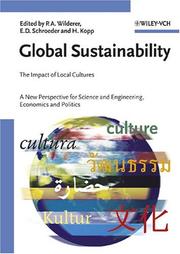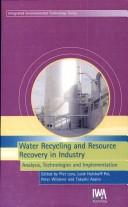| Listing 1 - 10 of 12 | << page >> |
Sort by
|
Book
Year: 1997 Publisher: München : Technische Universität München. Wassergüte- und Abfallwirtschaft,
Abstract | Keywords | Export | Availability | Bookmark
 Loading...
Loading...Choose an application
- Reference Manager
- EndNote
- RefWorks (Direct export to RefWorks)
Book
ISBN: 331924356X 3319243586 Year: 2016 Publisher: Cham : Springer International Publishing : Imprint: Springer,
Abstract | Keywords | Export | Availability | Bookmark
 Loading...
Loading...Choose an application
- Reference Manager
- EndNote
- RefWorks (Direct export to RefWorks)
The authors of this book, who represent a broad range of scientific disciplines, discuss the issue of centralized versus decentralized control and regulation in the context of sustainable development. The stability and resilience of complex technical, economic, societal and political systems are commonly assumed to be highly dependent on the effectiveness of sophisticated, mainly centralized regulation and control systems and governance structures, respectively. In nature, however, life is mainly self-regulated by widespread, mainly DNA-encoded control mechanisms. The fact that life has endured for more than 2.4 billion years suggests that, for man-made systems, decentralized control concepts are superior to centralized ones. The authors discuss benefits and drawbacks of both approaches to achieving sustainability, providing valuable information for students and professional decision makers alike.
Sustainable development. --- Environmental Sciences --- Earth & Environmental Sciences --- Decentralization. --- Globalization. --- Global cities --- Globalisation --- Internationalization --- International relations --- Anti-globalization movement --- Environmental economics. --- Endangered ecosystems. --- Sustainable Development. --- Earth System Sciences. --- Water Policy/Water Governance/Water Management. --- Environmental Economics. --- Ecosystems. --- Threatened ecosystems --- Biotic communities --- Nature conservation --- Economics --- Environmental quality --- Development, Sustainable --- Ecologically sustainable development --- Economic development, Sustainable --- Economic sustainability --- ESD (Ecologically sustainable development) --- Smart growth --- Sustainable development --- Sustainable economic development --- Economic development --- Environmental aspects --- Economic aspects --- Physical geography. --- Environmental management. --- Biocenoses --- Biocoenoses --- Biogeoecology --- Biological communities --- Biomes --- Biotic community ecology --- Communities, Biotic --- Community ecology, Biotic --- Ecological communities --- Ecosystems --- Natural communities --- Ecology --- Population biology --- Environmental stewardship --- Stewardship, Environmental --- Environmental sciences --- Management --- Geography
Digital
ISBN: 9783319243580 Year: 2016 Publisher: Cham Springer International Publishing
Abstract | Keywords | Export | Availability | Bookmark
 Loading...
Loading...Choose an application
- Reference Manager
- EndNote
- RefWorks (Direct export to RefWorks)
The authors of this book, who represent a broad range of scientific disciplines, discuss the issue of centralized versus decentralized control and regulation in the context of sustainable development. The stability and resilience of complex technical, economic, societal and political systems are commonly assumed to be highly dependent on the effectiveness of sophisticated, mainly centralized regulation and control systems and governance structures, respectively. In nature, however, life is mainly self-regulated by widespread, mainly DNA-encoded control mechanisms. The fact that life has endured for more than 2.4 billion years suggests that, for man-made systems, decentralized control concepts are superior to centralized ones. The authors discuss benefits and drawbacks of both approaches to achieving sustainability, providing valuable information for students and professional decision makers alike.
Economics --- Geology. Earth sciences --- General ecology and biosociology --- Water supply. Water treatment. Water pollution --- Environmental protection. Environmental technology --- Production management --- Physical geography --- environment --- waterbehandeling --- duurzaamheid --- economie --- waterverontreiniging --- milieubeleid --- milieuzorg --- duurzame ontwikkeling --- geologie --- fysische geografie --- aarde (astronomie) --- ecosystemen
Book
Year: 2007 Publisher: Berching : IWA Publishing,
Abstract | Keywords | Export | Availability | Bookmark
 Loading...
Loading...Choose an application
- Reference Manager
- EndNote
- RefWorks (Direct export to RefWorks)
"The supply of healthy drinking water and disposal of our wastewater is a central problem. Solving this problem is one of the claims of the UN Millennium Development Goals, and consequently an obligation for all those involved with water to join efforts in finding solutions. Climate change, population growth, migration and urban sprawl are factors forcing us to reconsider the traditional approach to urban water management. The water supply and sanitation infrastructure currently in use worldwide was developed in and for countries which are relatively wealthy, and which have access to plenty of water. Is it really wise to build the same kind of infrastructure and to apply the same methods and processes in regions with different climatic, ecological and economical conditions? Should we maintain our flush and discharge sanitation concepts while freshwater is becoming a limited resource? Aren't there smarter more environmentally sound methods to use and safegaurd our precious water resources? Are water authorities, city planners, architects, regulators and politicians ready to accept innovative solutions deviating from those described in textbooks? Questions like these were raised during the International Symposium Water Supply and Sanitation for All held in Berching, Germany from September 27 - 28, 2007. This book collects the papers presented at this conference."
Book
Year: 2007 Publisher: Berching : IWA Publishing,
Abstract | Keywords | Export | Availability | Bookmark
 Loading...
Loading...Choose an application
- Reference Manager
- EndNote
- RefWorks (Direct export to RefWorks)
"The supply of healthy drinking water and disposal of our wastewater is a central problem. Solving this problem is one of the claims of the UN Millennium Development Goals, and consequently an obligation for all those involved with water to join efforts in finding solutions. Climate change, population growth, migration and urban sprawl are factors forcing us to reconsider the traditional approach to urban water management. The water supply and sanitation infrastructure currently in use worldwide was developed in and for countries which are relatively wealthy, and which have access to plenty of water. Is it really wise to build the same kind of infrastructure and to apply the same methods and processes in regions with different climatic, ecological and economical conditions? Should we maintain our flush and discharge sanitation concepts while freshwater is becoming a limited resource? Aren't there smarter more environmentally sound methods to use and safegaurd our precious water resources? Are water authorities, city planners, architects, regulators and politicians ready to accept innovative solutions deviating from those described in textbooks? Questions like these were raised during the International Symposium Water Supply and Sanitation for All held in Berching, Germany from September 27 - 28, 2007. This book collects the papers presented at this conference."

ISBN: 9783527312368 Year: 2005 Publisher: Weinheim Wiley-VCH
Abstract | Keywords | Export | Availability | Bookmark
 Loading...
Loading...Choose an application
- Reference Manager
- EndNote
- RefWorks (Direct export to RefWorks)
Multi
ISBN: 9783030744588 9783030744571 9783030744595 9783030744601 Year: 2022 Publisher: Cham Springer International Publishing
Abstract | Keywords | Export | Availability | Bookmark
 Loading...
Loading...Choose an application
- Reference Manager
- EndNote
- RefWorks (Direct export to RefWorks)
This volume builds on an international workshop held in 2019, inspired by James Lovelock's "The Revenge of Gaia - Why the Earth Is Fighting Back, and How We Can Still Save Humanity". It, therefore, understands the Gaia concept as an umbrella term for the living world that planet Earth is hosting for nearly 4 billion years. Humankind has intervened in this ecosystem since its emergence on the planet about 2.5 million years ago, often with painful consequences for itself. In its reactions, the Earth system follows only the laws of nature. Consequently, humanity needs to develop strategies for a sustainable Earth system. This volume presents a unique trans- and interdisciplinary variety of approaches to this challenge, offering philosophical considerations as well as practical medical research. It addresses a broad knowledgeable and general audience in environmental management, public administration, and higher education alike. .
Dissertation
Year: 1969 Publisher: Karlsruhe Universität Karlsruhe
Abstract | Keywords | Export | Availability | Bookmark
 Loading...
Loading...Choose an application
- Reference Manager
- EndNote
- RefWorks (Direct export to RefWorks)

ISBN: 1843390051 Year: 2002 Publisher: London : Cornwall : IWA Publishing, TJ International Ltd,
Abstract | Keywords | Export | Availability | Bookmark
 Loading...
Loading...Choose an application
- Reference Manager
- EndNote
- RefWorks (Direct export to RefWorks)
Water Recycling and Resource Recovery in Industry : Analysis, Technologies and Implementation provides a definitive and in-depth discussion of the current state-of-the-art tools and technologies enabling the industrial recycling and reuse of water and other resources.The book also presents in detail how these technologies can be implemented in order to maximize resource recycling in industrial practice, and to integrate water and resource recycling in ongoing industrial production processes.Special attention is given to non-process engineering aspects such as systems analysis, software tools, health, regulations, life-cycle analysis, economic impact and public participation. Case studies illustrate the huge potential of environmental technology to optimise resource utilisation in industry. The large number of figures, tables and case studies, together with the book's multidisciplinary approach, makes Water Recycling and Resource Recovery in Industry: Analysis, Technologies and Implementation the perfect reference work for academics, professionals and consultants dealing with industrial water resources recovery.
Water reuse --- Eau --- Réutilisation --- Water reuse. --- Agrotechnology and Food Sciences. Engineering --- Waste treatment --- Waste Water Treatment --- Waste Water Treatment. --- Réutilisation --- Déchets industriels --- Déchets industriels
Book
ISBN: 3319662333 3319662325 Year: 2018 Publisher: Cham : Springer International Publishing : Imprint: Springer,
Abstract | Keywords | Export | Availability | Bookmark
 Loading...
Loading...Choose an application
- Reference Manager
- EndNote
- RefWorks (Direct export to RefWorks)
Here, expert authors delineate approaches that can support both decision makers as well as their concerned populations in overcoming unwarranted fears and in elaborating policies based on scientific evidence. Four exemplary focus areas were chosen for in-depth review, namely: - The scientific basis of risk management - Risk management in the area of environmental and ecological policy - Risk management in radiation medicine - Risk management in context with digitalization and robotics General as well as specific recommendations are summarized in a memorandum. Fundamental thoughts on the topic are presented in the introductory part of the book. The idea for and contents of the book were developed at a workshop on “Sustainable Risk Management: How to manage risks in a sensible and responsible manner?” held in Feldafing at Lake Starnberg (Germany) on April 14 to 16, 2016. The book offers important information and advice for scientists, entrepren eurs, administrators and politicians.
Risk management --- Sustainability --- Sustainability science --- Environment. --- Industrial management --- Environmental sciences. --- Quality control. --- Reliability. --- Industrial safety. --- Sustainable development. --- Environmental economics. --- Sustainable Development. --- Environmental Science and Engineering. --- Environmental Economics. --- Development and Sustainability. --- Sustainability Management. --- Quality Control, Reliability, Safety and Risk. --- Environmental aspects. --- Human ecology --- Social ecology --- Economic development—Environmental aspects. --- Industrial management-Environmen. --- System safety. --- Safety, System --- Safety of systems --- Systems safety --- Accidents --- Industrial safety --- Systems engineering --- Economics --- Environmental quality --- Development, Sustainable --- Ecologically sustainable development --- Economic development, Sustainable --- Economic sustainability --- ESD (Ecologically sustainable development) --- Smart growth --- Sustainable development --- Sustainable economic development --- Economic development --- Prevention --- Environmental aspects --- Economic aspects --- Industrial management—Environmental aspects. --- Industrial accidents --- Industries --- Job safety --- Occupational hazards, Prevention of --- Occupational health and safety --- Occupational safety and health --- Prevention of industrial accidents --- Prevention of occupational hazards --- Safety, Industrial --- Safety engineering --- Safety measures --- Safety of workers --- System safety --- Dependability --- Trustworthiness --- Conduct of life --- Factory management --- Industrial engineering --- Reliability (Engineering) --- Sampling (Statistics) --- Standardization --- Quality assurance --- Quality of products --- Environmental science --- Science
| Listing 1 - 10 of 12 | << page >> |
Sort by
|

 Search
Search Feedback
Feedback About UniCat
About UniCat  Help
Help News
News